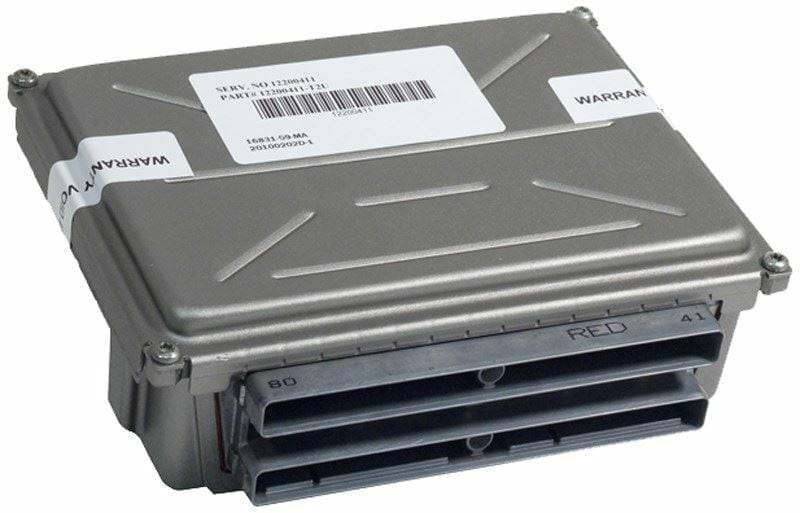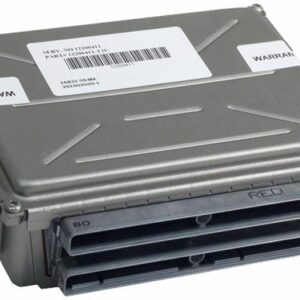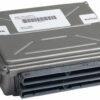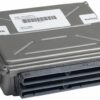Restore Your GM’s Reliability and Performance
Is your 2002 Cadillac Escalade or another trusted GM vehicle suddenly giving you headaches? Frustrating issues like a persistent Check Engine Light, rough idling, poor fuel economy, or even a no-start condition can often be traced back to a single, critical component: the Powertrain Control Module (PCM). As the central computer for your engine and transmission, when the PCM begins to fail, it can create a cascade of problems that are difficult to diagnose and expensive to fix at a dealership.
This isn’t just a replacement part; it’s a complete solution. We offer a reliable Engine Control Module, part number 12576160, that arrives at your door pre-programmed with the latest official GM software updates. All we need is your vehicle’s VIN. This critical step ensures that the module is perfectly matched to your vehicle’s specific configuration, eliminating the need for expensive scan tools or a trip to the dealer for programming. This is the direct, effective fix you’ve been looking for to get your truck or SUV running smoothly again.
A Technician’s Notebook: The Intermittent Stall on the Sierra
I had a 2001 GMC Sierra 2500 in the bay that was a real puzzle. The owner complained of random stalling at stoplights, but it never threw a consistent code. We checked fuel pressure, sensors, and wiring harnesses for days. Everything seemed fine. On a hunch, I tapped the PCM casing with a screwdriver handle while the engine was running, and it immediately stumbled. The problem was internal to the module, a hairline crack in a solder joint that only separated when warm. Replacing the unit with a pre-programmed 2002 Escalade PCM (which cross-references) solved the issue instantly. It saved the customer from more diagnostic fees and got a reliable work truck back on the road.
Is Your GM Showing These Signs of PCM Failure?
- ✔ Persistent Check Engine Light (CEL) with codes like P0601, P0602, or P0606.
- ✔ The engine cranks but refuses to start.
- ✔ Unexplained drops in fuel mileage.
- ✔ Harsh or erratic automatic transmission shifting.
- ✔ The vehicle stalls unexpectedly, either while driving or at idle.
- ✔ Failure to pass state emissions testing.
- ✔ Communication errors with diagnostic scan tools.
A Straightforward Guide to PCM Installation
Replacing the PCM on most compatible GM vehicles is a manageable job for a DIYer with basic hand tools. While specific locations vary slightly, the general process is consistent.
- Safety First: Always disconnect the negative terminal from your vehicle’s battery and wait at least 10 minutes for the system to fully discharge.
- Locate the PCM: On most trucks and SUVs like the Escalade, Tahoe, and Silverado, the PCM is located in the engine bay, typically on the driver’s side fender well, sometimes under a plastic cover or near the battery. On vans like the Express, it’s often in the LH rear of the engine compartment.
- Disconnect the Harnesses: The PCM has multiple large electrical connectors. They feature locking levers or tabs. Carefully release the locks and gently pull the connectors straight out. Never force them.
- Remove the Old Module: Unbolt the PCM from its mounting bracket. There are usually two or three bolts holding it in place.
- Install the New Module: Seat your new, pre-programmed PCM into the mounting bracket and secure it with the bolts. Reconnect the electrical harnesses, ensuring they click securely into place and the locking levers are engaged.
- Reconnect the Battery: Reattach the negative battery terminal.
- Perform Security Relearn: Your vehicle will likely require a simple security relearn procedure to recognize the new PCM. This typically involves turning the key to the ‘ON’ position for 10-15 minutes, then off, and repeating two more times before starting the engine. This allows the BCM and new PCM to synchronize.
Verified Vehicle Compatibility List
This module is a direct replacement for part numbers 12200411, 12201281, 12576160, and 52369718. It is confirmed to fit the following vehicles:
- Cadillac Escalade / EXT: 2002
- Chevrolet Avalanche 1500 / 2500: 2002
- Chevrolet / GMC Silverado / Sierra 1500, 2500, 3500 (Gasoline): 2001-2002
- Chevrolet / GMC Suburban / Yukon / Yukon XL 1500, 2500: 2001-2002
- Chevrolet Tahoe: 2001-2002
- Chevrolet Express / GMC Savana 1500, 2500, 3500 (Gasoline): 2001-2002
- Chevrolet Camaro / Pontiac Firebird (5.7L): 2001-2002
- Chevrolet S10 / GMC Sonoma (4.3L): 2001-2002
- Chevrolet Blazer / GMC Jimmy: 2001-2002
- Chevrolet Astro / GMC Safari: 2000-2002
- Chevrolet Corvette: 2001-2003
- Oldsmobile Bravada: 2001
Frequently Asked Questions
What do you need from me after I purchase?
After you complete your purchase, you must provide us with your 17-digit Vehicle Identification Number (VIN). We use this to load the correct, updated GM software for your specific vehicle before we ship the module.
Will I need to do any additional programming after installation?
No dealer programming is required. However, you will need to perform a simple security relearn procedure (often called a ‘key-on’ relearn) which takes about 30 minutes with no special tools. On some vehicles, a Crankshaft Variation (CASE) relearn may be needed to clear a related code, which can be done by some local shops or with certain high-level scan tools.
Is this a guaranteed fit for my vehicle?
Yes, if your vehicle is on the compatibility list and your original module matches one of the listed part numbers (12200411, 12201281, 12576160, 52369718), this is a direct-fit replacement. Providing your VIN ensures we program it perfectly for your application.
Why are the latest GM software updates important?
Vehicle manufacturers often release software updates to fix bugs, improve transmission shift points, enhance fuel efficiency, and correct other drivability issues that were discovered after the vehicle was built. Our programming service ensures your vehicle benefits from these factory improvements.
What if my vehicle has modifications?
This PCM is programmed with standard factory software. It is not designed for vehicles with significant performance modifications like aftermarket camshafts, forced induction, or non-stock injectors. It is intended to restore original factory performance and operation.



